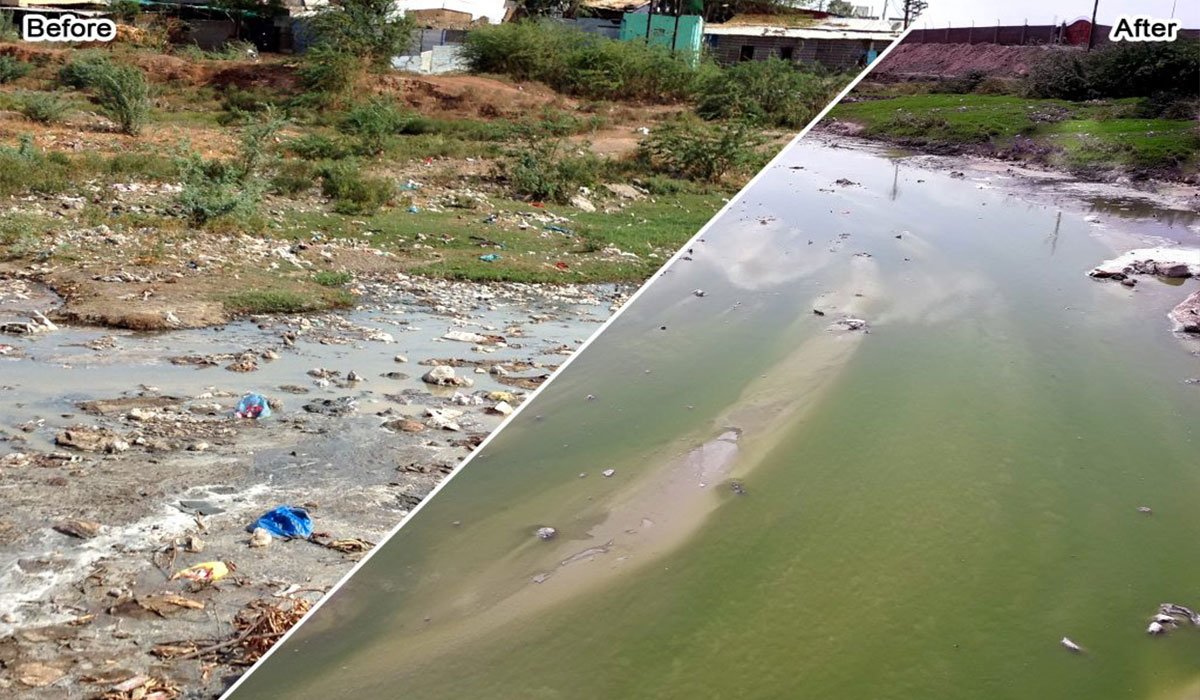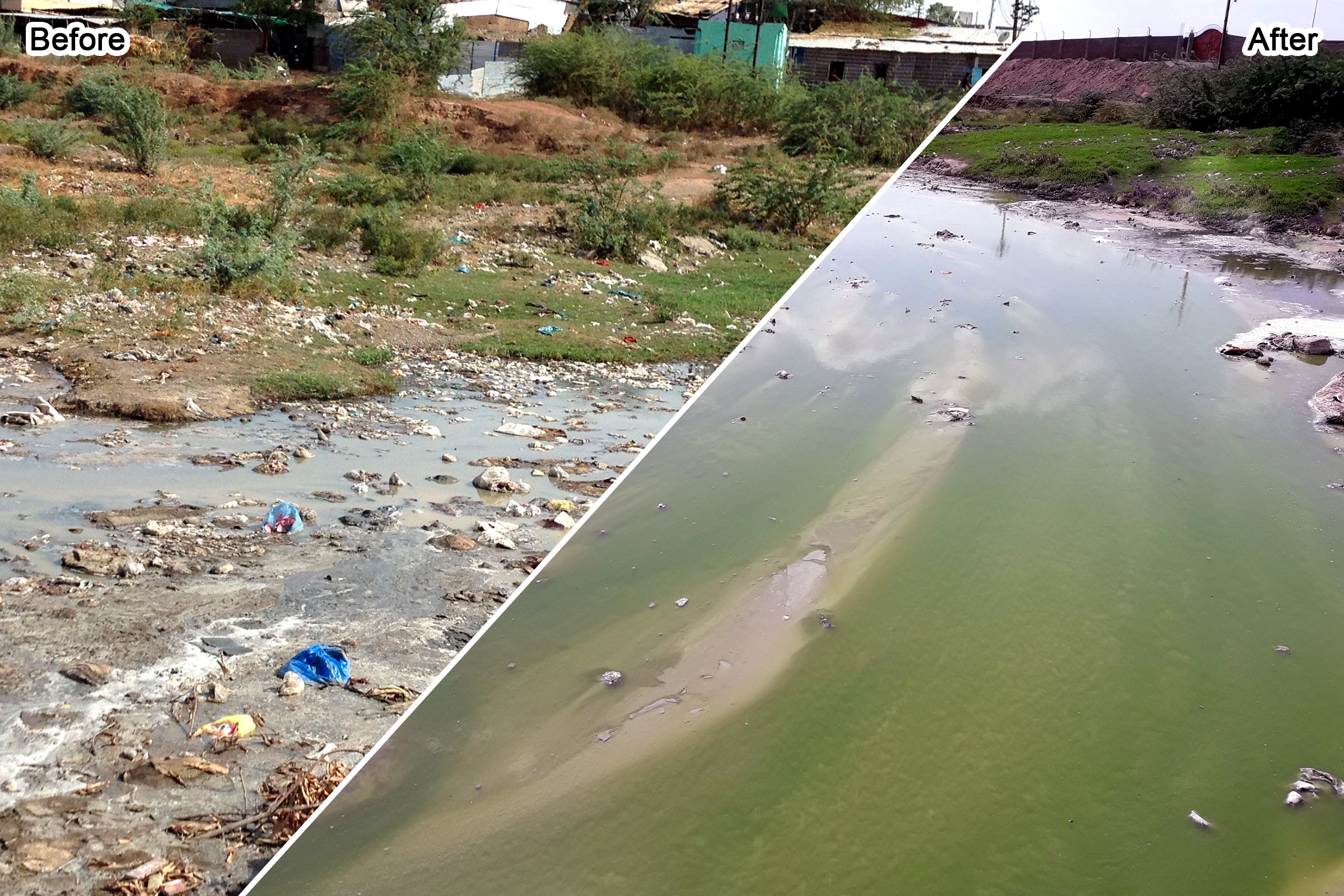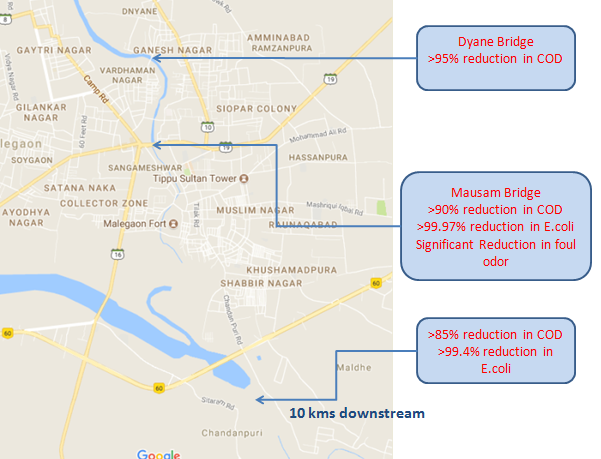

India’s first successful river bio-remediation exercise with 90% reduction in contamination levels and results visible over 10 km stretch.
Malegaon is a small city near Nasik in Maharashtra with a population of a little over 500,000. There is no Sewage Treatment Plant in the city, owing to which, the entire untreated sewage of 75 MLD is drained directly into the River Mausam. There is one large industrial unit there in Malegaon which is engaged in bleaching and mercerizing of gray fabric. Semi-treated, industrial effluent of 1.5 MLD capacity is drained directly into the River Mausam.
River Mausam is a seasonal river flowing through the heart of the city of Malegaon. Owing to a barrage just before the River enters the city, the river almost has no fresh water except during the rainy season.
After flowing for almost 10 – 12 kms through the entire city of Malegaon, the river Mausam merges into the River Girna, which eventually merges into the River Tapi.
Phycolinc commissioned a reputed 3rd party lab from Nashik which is both NABL and FASSI accredited to independently collect samples of the river from 3 different locations:
Before any treatment, The Report of waste water parameters of Mausam River are as below

INTERVENTION IN MALEGAON :
The industry in Malegaon was producing effluent with following characteristics:
The industry was spending close to Rs.2 Cr per annum in neutralizing their effluent from pH – 13 to pH-8. Owing to the presence of Poly Vinyl Alcohol (PVA) in the industry’s effluent, the Activated sludge process based ETP was not working smoothly and continuously getting disturbed and due to this effluent with High COD and BOD was being directly discharged in into the River on frequent basis which was causing environment damage.
Mausam River – Malegaon
India’s first successful river bio-remediation exercise with 90% reduction in contamination levels and results visible over 10 km stretch.
Malegaon is a small city near Nasik in Maharashtra with a population of a little over 500,000. There is no Sewage Treatment Plant in the city, owing to which, the entire untreated sewage of 75 MLD is drained directly into the River Mausam. There is one large industrial unit there in Malegaon which is engaged in bleaching and mercerizing of gray fabric. Semi-treated, industrial effluent of 1.5 MLD capacity is drained directly into the River Mausam.
River Mausam is a seasonal river flowing through the heart of the city of Malegaon. Owing to a barrage just before the River enters the city, the river almost has no fresh water except during the rainy season.
After flowing for almost 10 – 12 kms through the entire city of Malegaon, the river Mausam merges into the River Girna, which eventually merges into the River Tapi.
INTERVENTION IN MALEGAON :
PERC setup a phycoremediation plant for treating the industry’s effluent. The pH was corrected without chemicals to 8, saving Rs. 1.25 cr per year for the industry. The COD was reduced to less than 300 ppm.
The phycoremediation plant doubled up as an algal inoculum manufacturing setup. The micro-algae harvested was stabilized and added to beneficial, organism specific, organic micro-nutrients and then let out into the river.
The following changes were observed in the river after 3 weeks of treatment
.
Apart from the above quantitative parameters which improved significantly, there was a significant drop in smell in the entire city.
Following is the map of river and location of samples collected.

The way forward
The initiative was a huge success. Its impact is visible in an entire city of 500,000. The initiative directly impacts the Bottom of the Pyramid population, several of whom are dependent on the river for their bathing/washing needs. The initiative also provides a template for the National Mission for Clean Ganga and other such river bio-remediation activities.